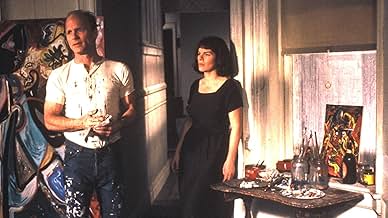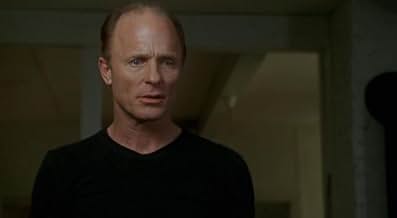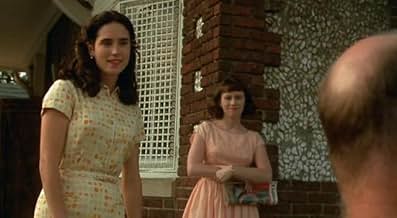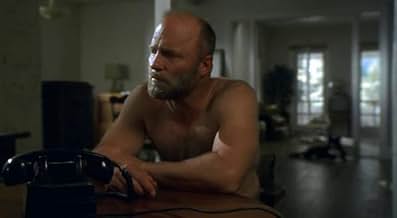CALIFICACIÓN DE IMDb
7.0/10
30 k
TU CALIFICACIÓN
Una película sobre la vida y la carrera del pintor estadounidense Jackson Pollock.Una película sobre la vida y la carrera del pintor estadounidense Jackson Pollock.Una película sobre la vida y la carrera del pintor estadounidense Jackson Pollock.
- Dirección
- Guionistas
- Elenco
- Ganó 1 premio Óscar
- 3 premios ganados y 10 nominaciones en total
Eulala Scheel
- Arloie's Baby
- (as Eulala Grace Harden)
Opiniones destacadas
Films like "Pollock" always leave me at a loss when I have to describe them to others. For one thing, it's long been a labor of love for director / star Ed Harris, which maybe causes me to have more sympathy for the picture than I should -- after all, I'd hate to ream a project that he's spent so much time and energy developing. For another thing, I usually find biopics a bit crippled because, in most cases ("Pollock" included), I already know the plot, and without the plot to get lost in, I'm left to look at little things like, you know, the acting, writing and directing. Lucky for Harris (and my conscience), then, that the acting is uniformly great, the direction is mostly seamless (and downright kinetic at times), and the writing, while not being great in the "Casablanca" sense of the word, serves the story well. "Pollock" dodges all the pitfalls that often turn biopics into boring history lessons.
The film picks up with Jackson Pollock the Unsuccessful Drunk (Harris), dabbling in surrealist painting and proclaiming Picasso to be a fraud. There's enough promise in his work, though, for him to gain a girlfriend, Lee Krasner (Marcia Gay Harden); a benefactor, Peggy Guggenheim (Amy Madigan); and a professional critic, Clement Greenberg (Jeffrey Tambor), who champions his work in print. From there we watch Pollock take the express train to art world superstardom, becoming one of the world's foremost abstract painters.
The fly in the ointment, though, is Pollock's notorious temper, aided and abetted by his equally notorious alcoholism. Life in New York City is doing his personal life no favors, so he and Krasner move to the countryside, and it's here that he stumbles upon his "drip method" of painting, granting him another wave of fame and recognition. It is this sequence, in which Pollock makes his pivotal discovery, where Harris's talent as a director comes to the fore. Although we're aware that we're watching an actor perform a discovery that was made by someone else more than fifty years ago, it's an exciting, dynamic moment as Harris dances around his canvas, flicking paint from his brush in a blur of motion. It doesn't come off as staged or phony, but as a moment of genuine discovery, and for those moments we might as well actually be watching Jackson Pollock revolutionize the art world.
From there, though, ego, alcohol, and the mechanics of change all prove to be Pollock's undoing, leading, of course, to his untimely demise. Through it all, Harris seethes with a feral intensity, giving a performance that should rightfully win him an Oscar (and check out the dramatic weight gain at the end. Tom who?). Harden, his co-nominee, is also excellent (although she's stuck uttering lines like, "You've done it, Pollock. You've cracked it wide open."). In lesser hands, Krasner could be just another version of the screeching, wailing, put-upon wife, but Harden bolsters the anguish with a fine layer of anger; the torment of a woman who loves the person causing her misery, but who is unwilling to let go of the principles which led her to enter and maintain the relationship on her own terms.
"Pollock" ultimately succeeds because we know how it will end, we clearly see how unpleasant and deluded the artist had become, and still we can't look away. Harris's labor of love serves as an auspicious debut for someone who, at this stage, seems just as skilled behind the camera as he is in front of it.
The film picks up with Jackson Pollock the Unsuccessful Drunk (Harris), dabbling in surrealist painting and proclaiming Picasso to be a fraud. There's enough promise in his work, though, for him to gain a girlfriend, Lee Krasner (Marcia Gay Harden); a benefactor, Peggy Guggenheim (Amy Madigan); and a professional critic, Clement Greenberg (Jeffrey Tambor), who champions his work in print. From there we watch Pollock take the express train to art world superstardom, becoming one of the world's foremost abstract painters.
The fly in the ointment, though, is Pollock's notorious temper, aided and abetted by his equally notorious alcoholism. Life in New York City is doing his personal life no favors, so he and Krasner move to the countryside, and it's here that he stumbles upon his "drip method" of painting, granting him another wave of fame and recognition. It is this sequence, in which Pollock makes his pivotal discovery, where Harris's talent as a director comes to the fore. Although we're aware that we're watching an actor perform a discovery that was made by someone else more than fifty years ago, it's an exciting, dynamic moment as Harris dances around his canvas, flicking paint from his brush in a blur of motion. It doesn't come off as staged or phony, but as a moment of genuine discovery, and for those moments we might as well actually be watching Jackson Pollock revolutionize the art world.
From there, though, ego, alcohol, and the mechanics of change all prove to be Pollock's undoing, leading, of course, to his untimely demise. Through it all, Harris seethes with a feral intensity, giving a performance that should rightfully win him an Oscar (and check out the dramatic weight gain at the end. Tom who?). Harden, his co-nominee, is also excellent (although she's stuck uttering lines like, "You've done it, Pollock. You've cracked it wide open."). In lesser hands, Krasner could be just another version of the screeching, wailing, put-upon wife, but Harden bolsters the anguish with a fine layer of anger; the torment of a woman who loves the person causing her misery, but who is unwilling to let go of the principles which led her to enter and maintain the relationship on her own terms.
"Pollock" ultimately succeeds because we know how it will end, we clearly see how unpleasant and deluded the artist had become, and still we can't look away. Harris's labor of love serves as an auspicious debut for someone who, at this stage, seems just as skilled behind the camera as he is in front of it.
As heavy and darkly textured a film as any one of his masterpieces, director and star Ed Harris takes us into the tortured, inebriated world of abstract painter Jackson Pollock (1912-1956)and leaves us assured that Pollock is a certifiable candidate for the Hall of Fame "self-destructive genius" award, joining the illustrious, besotted ranks of Ernest Hemingway, Hank Williams, John Barrymore, Helen Morgan, et al. True, when has Hollywood ever bothered to put on cinematic display a gifted artist who wasn't a poster child for Betty Ford? We usually reserve well-adjusted geniuses for quieter, more tasteful retrospectives on cable TV.
Harris spares no time in letting us know that Pollock is a crude, mindless, gifted mess veering toward unmitigated disaster, taking everything and everyone down with him as he does. Amazingly, in his brutally brief 44 years, Pollock manages to find, with a man-child brilliance, his life's destiny as a master of artistic expression and interpretation and the accidental inventor of the drip-action technique. Harris painstakingly chronicles the little known details of this wretched genius who somehow learned how to free up his own artistic mind while confine the rest of his world to an absolute hell.
The actor/director wisely manages to avoid most of the pitfalls characteristic of these grand bios of agony and angst. In a stark, no-holds-barred performance, he lays the character out like it is -- unredeeming, hopeless, desperate, supremely gifted, yet intriguing. Its a daunting, fully etched performance that, in lesser hands, could have been one long cliche. He doesn't toy with the audience by thinking had the right circumstances come along for Pollock (and they DID come along with wife and caretaker, Lee Krasner) he could have somehow prevailed. Harris is quite believable, losing himself in the painter while showing off his researched skills with a brush. It's a true labor of love and it shows.
Marcia Gay Harden's self-sacrificing Krasner breathes life not only into Pollock but the film itself. Harden, in a rich, flashy portrayal, is mesmerizing as one artist compelled to save another, giving interesting dimension to a woman whose reasons are not totally pure and selfless. Amy Madigan (Harris' wife in real life) makes the most of her few scenes as the eccentric museum maven Peggy Guggenheim, while Val Kilmer appears in an odd, thankless cameo. Harris and Harden were both deservedly Oscar-nominated for their work here.
Yet, problems do creep into the film. While Harris pours his heart and soul into this show (a ten-year pet project, so they say), Pollock's "before life" is never set up to demonstrate why Pollock became such an inveterate drunk and monster. As such, little sympathy can be mustered, holding viewers at bay. Moreover, a couple of manipulative scenes also seem to be thrown in merely to punctuate the already well-worn theme of Pollock's misery and desolation. Less is more in this case. For the most parts, however, this little film succeeds.
Until now, little attention has been paid to the artist Jackson Pollock. Harris rectifies this injustice, as reprehensible as some of it is, with unsparing honesty, dedication and precision.
Harris spares no time in letting us know that Pollock is a crude, mindless, gifted mess veering toward unmitigated disaster, taking everything and everyone down with him as he does. Amazingly, in his brutally brief 44 years, Pollock manages to find, with a man-child brilliance, his life's destiny as a master of artistic expression and interpretation and the accidental inventor of the drip-action technique. Harris painstakingly chronicles the little known details of this wretched genius who somehow learned how to free up his own artistic mind while confine the rest of his world to an absolute hell.
The actor/director wisely manages to avoid most of the pitfalls characteristic of these grand bios of agony and angst. In a stark, no-holds-barred performance, he lays the character out like it is -- unredeeming, hopeless, desperate, supremely gifted, yet intriguing. Its a daunting, fully etched performance that, in lesser hands, could have been one long cliche. He doesn't toy with the audience by thinking had the right circumstances come along for Pollock (and they DID come along with wife and caretaker, Lee Krasner) he could have somehow prevailed. Harris is quite believable, losing himself in the painter while showing off his researched skills with a brush. It's a true labor of love and it shows.
Marcia Gay Harden's self-sacrificing Krasner breathes life not only into Pollock but the film itself. Harden, in a rich, flashy portrayal, is mesmerizing as one artist compelled to save another, giving interesting dimension to a woman whose reasons are not totally pure and selfless. Amy Madigan (Harris' wife in real life) makes the most of her few scenes as the eccentric museum maven Peggy Guggenheim, while Val Kilmer appears in an odd, thankless cameo. Harris and Harden were both deservedly Oscar-nominated for their work here.
Yet, problems do creep into the film. While Harris pours his heart and soul into this show (a ten-year pet project, so they say), Pollock's "before life" is never set up to demonstrate why Pollock became such an inveterate drunk and monster. As such, little sympathy can be mustered, holding viewers at bay. Moreover, a couple of manipulative scenes also seem to be thrown in merely to punctuate the already well-worn theme of Pollock's misery and desolation. Less is more in this case. For the most parts, however, this little film succeeds.
Until now, little attention has been paid to the artist Jackson Pollock. Harris rectifies this injustice, as reprehensible as some of it is, with unsparing honesty, dedication and precision.
Jackson Pollock (Ed Harris) is famous with a Life magazine cover in 1950. The movie flashes back to 1941. He's a drunk staying in Greenwich Village with his brother and pregnant wife. Artist Lee Krasner (Marcia Gay Harden) shows some interest and becomes his lover/supporter. His brother moves to Connecticut. Jackson breaks down which is why he can't be drafted into the war. Lee takes Jackson home acting more and more like his manager. His work eventually gains the attention of art collector Peggy Guggenheim (Amy Madigan) who gives him an one-man show in 1943. Lee and Jackson decides to move to a country house on Long Island away from the drinking and doing more work. His paintings are still not selling and then the Life article happens. Lee and Jackson have a roller-coaster relationship and then he has an affair with Ruth Kligman (Jennifer Connelly).
Ed Harris directs a mostly straight forward biopic of Jackson Pollock with a few fascinating scenes of painting sessions. His directing style doesn't necessarily project Jackson mental breakdowns but his acting is able to bridge the gap. Ed Harris is not the most imaginative director visually but it is overcome by good actors doing good work. It is a good debut directorial effort.
Ed Harris directs a mostly straight forward biopic of Jackson Pollock with a few fascinating scenes of painting sessions. His directing style doesn't necessarily project Jackson mental breakdowns but his acting is able to bridge the gap. Ed Harris is not the most imaginative director visually but it is overcome by good actors doing good work. It is a good debut directorial effort.
Jackson Pollock was not a likable person. He was an alcoholic, an adulterer, an egotist and simply a plain jerk. He also was a pioneer in the field of modern art, so he became famous and hence, even had this movie about his life.
Ed Harris, a jerk himself, was a good choice for the role. Harris, who looks like Pollock, did a fine job of portraying this "tormented" soul, a word critics love to use for famous artists (see Van Gogh).
This was an interesting film and I watched it twice. It inspired me to become an artist and I did a handful of Pollock imitations, several of which sold for a decent price. I love Pollock's work, and I enjoy character studies of people on film . But this gets a little sordid as the film goes on with a definitely-unhappy ending.
Hat's off to Marcia Gay Harden for her performance as Pollock's wife. She has the New York City accent down pat. She is shown worshiping her husband and it's painful to see her get hurt.
The story is a bit soap operish but if you enjoy art, and especially Pollock's work, you'll find this story fascinating. More than one look, however, changes the canvas, so to speak. The story, more than the art, then will come through more and that can be too much of a downer. So, visit this "art show" once and leave it at that.
Ed Harris, a jerk himself, was a good choice for the role. Harris, who looks like Pollock, did a fine job of portraying this "tormented" soul, a word critics love to use for famous artists (see Van Gogh).
This was an interesting film and I watched it twice. It inspired me to become an artist and I did a handful of Pollock imitations, several of which sold for a decent price. I love Pollock's work, and I enjoy character studies of people on film . But this gets a little sordid as the film goes on with a definitely-unhappy ending.
Hat's off to Marcia Gay Harden for her performance as Pollock's wife. She has the New York City accent down pat. She is shown worshiping her husband and it's painful to see her get hurt.
The story is a bit soap operish but if you enjoy art, and especially Pollock's work, you'll find this story fascinating. More than one look, however, changes the canvas, so to speak. The story, more than the art, then will come through more and that can be too much of a downer. So, visit this "art show" once and leave it at that.
a good film, though perhaps i was expecting a little more. The psyche of a troubled artist is somewhat predestined these days and maybe it is just that our assumptions are correct as they are all portrayed in a predictable way. If this is how the artist truly was then then Harris could have done nothing different, it just seems a little distant. I didn't feel at one with the artist, i couldn't sympathise with him or feel his pain. The 'intellectual' artistic debates and gendredising continuously used by his wive left me with no sympathy for her. She appears desperate from the first scene pretentiously trying to be involved with the next big thing. The most depressing part of this film is that two people can be stupid enough to waste their lives on each other without searching for the happiness which they truly seek. The emphasis is on Pollock as a man whereas i would like to see more of him as an artist, did his individual paintings have meaning or did he just do them out of hate for the world.... i guess i didn't feel you see his mind and its true agony's, maybe he was just generally mad at the world.
Really not a bad film for what it is, just to me it lacked true emotion.
sio
Really not a bad film for what it is, just to me it lacked true emotion.
sio
¿Sabías que…?
- TriviaEd Harris's father, Bob L. Harris, bought his son a book about Jackson Pollock simply because he felt Ed bore a strong resemblance to the painter. Ever since then, Ed Harris became fascinated with Pollock's life.
- ErroresWhen the photographer is making the movie of Pollock, he "zooms" in on the shoes. But the old 16 mm camera he is using has a turret with three fixed lenses; thus, he should not be able to zoom. All his other shots are as expected from fixed lenses of different focal lengths.
- Citas
Jackson Pollock: If people would just look at the paintings, I don't think they would have any trouble enjoying them. It's like looking at a bed of flowers, you don't tear your hair out over what it means.
- Bandas sonorasThe Mighty Blues
Improvisation
Performed by The Port of Harlem Jazzmen
Courtesy of Blue Note Records
By Arrangement with EMI Capitol Music Special Markets
Selecciones populares
Inicia sesión para calificar y agrega a la lista de videos para obtener recomendaciones personalizadas
- How long is Pollock?Con tecnología de Alexa
Detalles
Taquilla
- Presupuesto
- USD 6,000,000 (estimado)
- Total en EE. UU. y Canadá
- USD 8,598,593
- Fin de semana de estreno en EE. UU. y Canadá
- USD 44,244
- 17 dic 2000
- Total a nivel mundial
- USD 10,994,533
- Tiempo de ejecución2 horas 2 minutos
- Color
- Mezcla de sonido
- Relación de aspecto
- 1.85 : 1
Contribuir a esta página
Sugiere una edición o agrega el contenido que falta

Principales brechas de datos
By what name was Pollock (2000) officially released in India in English?
Responda































